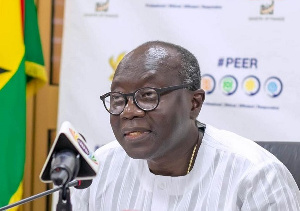ENI welcomes Ghana’s decision to withdraw unitisation directives

Eni has welcomed the decision of the Ministry of Energy and Green Transition to withdraw the unitization directives about the Sankofa Oil Field issued in 2020.
A statement issued by Eni, as quoted by the Ghana News Agency, said: “In line with the Government’s objectives, Eni remains committed to leverage its portfolio of innovative projects, seizing new opportunities both in traditional and transition energy sector, while strengthening domestic energy security and sustainability.”
On February 27, 2025, the government of Ghana withdrew an earlier directive issued by the erstwhile NPP administration, which mandated a compulsory unitisation between Springfield Exploration and Production Limited (Springfield) and Eni Ghana Exploration and Production Limited (ENI) concerning the Afina-1X Discovery and the Sankofa Cenomanian Oil Field.
The directive, issued in 2020 by the then-Ministry of Energy under the Akufo-Addo administration, has now been officially revoked.
In a letter addressed to the respective parties and signed by the Minister of Energy and Green Transition, John Abdulai Jinapor, the government stated that the decision followed a thorough review of the Arbitral Award-referenced SCC Arbitration U2021/114 (ENI & Vitol v. Ghana & GNPC) dated July 8, 2024, along with the legal opinion provided by the Attorney General and Minister of Justice.
The Tribunal, while acknowledging the potential value of unitisation in principle, identified several procedural flaws in the implementation of the directives, including:
• Absence of a statutory trigger for unitisation: The Tribunal determined that the conditions required under Section 34 of the Petroleum (Exploration and Production) Act, 2016 (Act 919), and Regulation 50 of the Petroleum (Exploration and Production) (General) Regulations, 2018 (L.I. 2359) were not satisfied.
• Arbitrary determination of initial tract participation: The allocation of participation interests was deemed arbitrary and unsupported by sufficient evidence, etc.
The Ministry of Energy, on its part, acknowledged the tribunal’s findings that while the issuance of the directives breached the Petroleum Agreement due to specific circumstances surrounding their implementation, the concept of unitisation itself was not deemed inherently unlawful.
This latest development provides Ghana with the flexibility to determine the most appropriate course of action in the national interest.
“In consequence, and in alignment with the discretionary powers vested in the Minister under Section 34 of Act 919 and Regulation 50 of L.I. 2359, the Ministry hereby withdraws the Unitisation Directives.
“The withdrawal of the directive is without prejudice to the power of the Minister to issue new directives upon subsequent evidence that such a measure is required for the equitable and efficient development of Ghana’s petroleum resources,” the statement read.
Meanwhile, the government of Ghana reiterated its commitment to maintaining a conducive environment for investments in the upstream petroleum sector, while ensuring compliance with the legal and regulatory framework governing the industry.
“I look forward to continuing our collaborative efforts to advance Ghana’s upstream development goals and strengthen trust with all our partners,” the Minister of Energy concluded.
On July 8, 2024, the International Court of Arbitration ruled that Springfield E&P should do further work to complete the unitisation process.
Following that ruling, and to comply with it, Springfield has worked to secure a rig and all other technical requirements to appraise and conduct a well test on the Afina-1x well.
Source: www.ghanaweb.com





